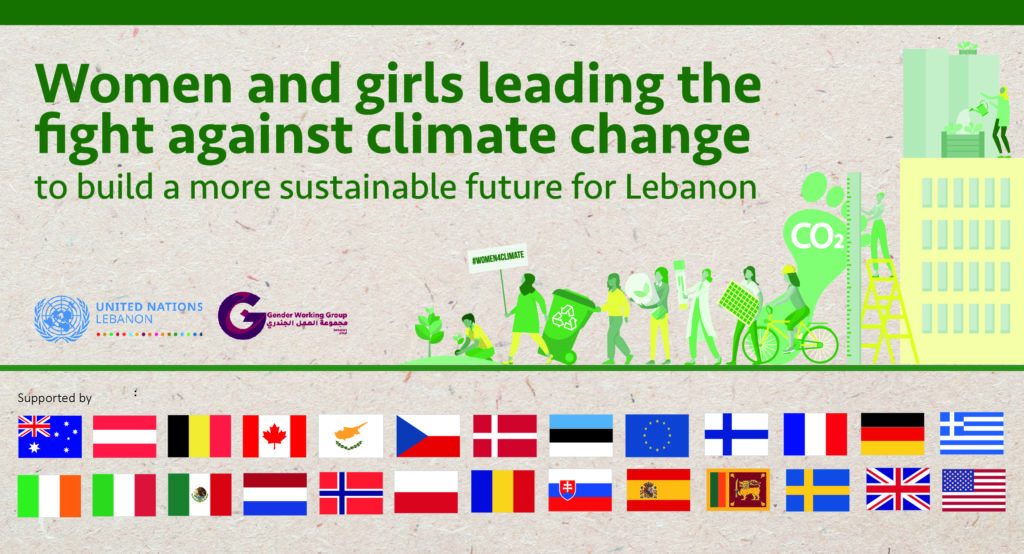
Today, March 8, International Women’s Day we celebrate women in Lebanon who are leading the fight against environmental degradation and climate change, working to build a more sustainable future for the country, and the global community.
Women, men, and children living in Lebanon have long endured challenging environmental conditions. As per Yale’s Environmental Performance Index 2020 (EPI) , Lebanon ranks 5th in the region (out of 17 Arab countries included in the analysis) and 78 out of 180 countries, globally: Those living in the country are breathing unsafe air, using unclean water and living in areas strewn with waste. The accumulation of decades of mismanagement and lack of investments in renewable energy sources, equitable energy distribution systems and public transportation have resulted in a reliance on private generators and cars, in untreated sewage, unmanaged industrial run off, and inaction on a trash crisis.
The impact of climate change and environmental degradation on people’s health is of serious concern; for example, long-term exposure to high levels of air pollution decreases lung function and increases the risk of respiratory symptoms in humans. Equally, this degradation of the environment is generating significant economic losses for a country already witnessing one of the world’s worst financial meltdowns since the 19th century, according to the World Bank. In 2015, the Government of Lebanon estimated that if not stopped, climate change and environmental degradation would result in an economic slowdown and a 300 million USD loss in GDP per year. International experts say they expect climate change to have a direct, negative impact on Lebanon’s densely populated coastal urban areas and its agricultural productivity, with deforestation, urbanization and illegal quarrying adding to the country’s list of environmental dangers.
In Lebanon, local NGOs, citizens and residents are working within their communities and in academia to develop solutions to address Lebanon’s environmental crisis. These span from recycling initiatives to energy solutions, and efforts to clean Lebanon’s waters.
Many of these initiatives exist because of the leadership and tenacity of women in Lebanon. This International Women’s Day, we celebrate women – in all their diversity – who are pioneering environmental change across the country, even in the most trying of circumstances. Climate change solutions cannot be successful without women. Women are at the forefront of international science as well as national resource management, often responsible for domestic and community aspects of energy and waste management. Women’s critical contribution to Lebanon’s environmental justice is yet another valuable reminder that the country’s political leadership must be diverse and prioritize women’s representation if it is to solve the current crises – including on the environment.
Climate change is one of the greatest challenges of our time; to stem it in Lebanon requires immediate action and attention. In its national climate plan, the government has set a 20 percent emission reduction target by 2030, towards net-zero commission by 2050, an increase from its 2015 target, and recently committed to the development of a 2050 long-term strategy for low emissions and resilient development strategies. These are ambitious targets; especially given the limited action we have seen to date. However, the right mix of policies, skills, incentives, political will and women’s leadership can influence public behavior, encourage the right investments and mitigate devastating outcomes for Lebanon’s cherished environment.
Those we recognize today – Aaida Ghadban, Carole Ayat, Caroline Chaptini, Dr. Maya Nehmeh, Dr. Mona Fawaz, Myriam Ghsoub, Nouhad Awwad, Nadida Raad and Dr. Najat Saliba- are amongst many women, who must be our guides and leaders. Let us celebrate their work and their contributions to making a future greener, equitable and prosperous Lebanon possible.
Rebekah Grindlay, Ambassador of Australia to Lebanon
René Paul Amry, Ambassador of Austria to Lebanon
Hubert Cooreman, Ambassador of Belgium to Lebanon
Boyan Belev, ambassador of Bulgaria to Lebanon
Chantal Chastenay, Ambassador of Canada to Lebanon
Panayiotis Kyriakou, Ambassador of Cyprus to Lebanon
Jiří Doležel ambassador of the Czech Republic to Lebanon
Merete Juhl, Ambassador of Denmark to Lebanon
Miko Haljas, Ambassador of Estonia to Lebanon
Ralph Tarraf, EU ambassador to Lebanon
Tarja Fernández, Ambassador of Finland to Lebanon
Anne Grillo, Ambassador of France to Lebanon
Andreas Kindl, Ambassador of Germany to Lebanon
Catherine Fountoulaki, Ambassador of Greece to Lebanon
Seán O Regan, Ambassador of Ireland to Lebanon
Nicoletta Bombardiere, Ambassador of Italy to Lebanon
Jose Ignacio Madrazo, Ambassador of Mexico to Lebanon
Hans Peter van der Woude, Ambassador of Netherlands to Lebanon
Martin Yttervik, Ambassador of Norway to Lebanon
Przemysław Niesiołowski, Ambassador of Poland to Lebanon
Radu-Cătălin Mardare, Ambassador of Romania to Lebanon
Marek Varga, Ambassador of Slovakia to Lebanon
José María Ferré de la Peña, Ambassador of Spain to Lebanon
Shani Calyaneratne Karunaratne, Ambassador of Sri Lanka to Lebanon
Ann Dismorr, Ambassador of Sweden to Lebanon
Ian Collard, Ambassador of the United Kingdom to Lebanon
Dorothy Shea, Ambassador of the United States to Lebanon
UN Special Coordinator for Lebanon Ms. Joanna Wronecka
Najat Rochdi, UN Deputy Special Coordinator for Lebanon, UN Resident and Humanitarian Coordinator for Lebanon
Melanie Hauenstein, Resident Representative, UNDP Lebanon
Rachel Dore-Weeks, Head of UN Women Lebanon





